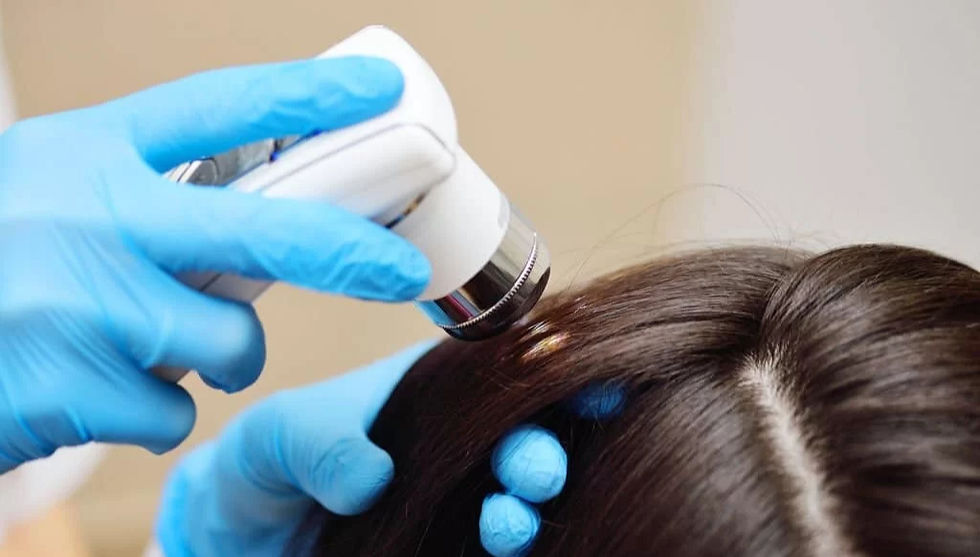How Growth Factors Support Healthy Hair
- Hair Again Clinic
- Feb 3
- 4 min read
Healthy hair is often regarded as a sign of vitality and attractiveness. However, factors such as age, genetics, and environmental stressors can cause hair health to decline. Recently, growth factors have emerged as a promising solution in maintaining and enhancing hair vitality. These biological molecules play a crucial role in cell signaling, and they have a significant impact on hair follicle growth and repair.

Understanding Growth Factors
Growth factors are proteins that regulate cell growth, proliferation, and differentiation. They facilitate communication between cells and stimulate various biological processes. In the context of hair health, growth factors can help to renew hair follicles, stimulate hair growth, and improve hair density.
One common type of growth factor associated with hair health is the vascular endothelial growth factor (VEGF). This growth factor enhances blood circulation to the hair follicles, supplying necessary nutrients and oxygen. Another important factor is the epidermal growth factor (EGF), which promotes keratinocyte proliferation and plays an essential role in the hair growth cycle.

The Role of Growth Factors in Hair Growth
When it comes to hair, growth factors help to activate the growth phase (anagen phase) of hair follicles. They stimulate stem cells in the hair follicle, encouraging them to divide and create new hair. This process is crucial for individuals experiencing hair thinning or loss.
Additionally, growth factors can help in reducing inflammation in the scalp. A healthy scalp environment is essential for optimal hair growth. By minimizing inflammation, growth factors promote a healthier follicle environment, which can lead to better hair density and overall appearance.
Research shows that incorporating growth factors into hair restoration treatments can enhance results. Some clinical studies indicate a significant improvement in hair count and density in individuals using products enriched with growth factors.
Does Growth Factor Really Work?
Many people wonder whether growth factors actually work when it comes to hair restoration. The short answer is yes, but the effectiveness can vary based on individual circumstances.
Several studies highlight the positive impact of growth factors on hair health. For example, a clinical trial published in the Journal of Drugs in Dermatology reported that participants using a topical formulation containing specifically chosen growth factors experienced a visible increase in hair density after several months of consistent use. Moreover, these participants reported less hair shedding during the treatment period.
The results suggest that while they may not be a miracle cure for everyone, growth factors offer a viable solution for enhancing hair health, especially when integrated as part of a comprehensive hair care routine.

Incorporating Growth Factors into Your Hair Care Routine
If you're interested in leveraging growth factors to support your hair health, here are some actionable recommendations to incorporate them into your routine:
Choose Quality Products: Look for shampoos, conditioners, or serums that contain growth factors. Products that include growth factor concentrate provide a concentrated dose of these effective proteins.
Follow Directions: Always use hair products as directed. Consistent application over time yields the best results. Incorporate these products into your daily or weekly routine as recommended.
Healthy Lifestyle Choices: Nourish your body with a balanced diet rich in vitamins and minerals. Nutrients like biotin, zinc, and vitamins A, C, and E, are essential for hair health. Staying hydrated and managing stress levels through regular exercise and relaxation techniques can also support hair growth.
Regular Scalp Massages: Scalp massages can stimulate blood flow to the hair follicles, helping grow hair. Pairing this with growth factor products can create a synergistic effect.
Consult a Professional: If you're experiencing severe hair loss, consulting a dermatologist or trichologist can be beneficial. They can recommend specific treatments, including those with growth factors, tailored to your needs.
Additional Strategies for Healthy Hair
In addition to utilizing growth factors, consider adopting some additional strategies for promoting healthy hair.
Maintain Scalp Health: Regular cleaning of the scalp is crucial. Ensure that you remove buildup from styling products and natural oils.
Limit Heat Styling: Excessive heat can cause hair damage. Limiting the use of blow dryers, curling irons, and straighteners helps maintain hair health.
Avoid Tight Hairstyles: Hairstyles that pull on the hair can cause breakage and traction alopecia. Opt for looser styles to minimize strain on the hair follicles.
Regular Trims: Keeping your hair trimmed helps eliminate split ends and promotes overall hair health.
The Future of Hair Restoration Treatments
The advancements in the field of hair restoration are promising, especially concerning the role of growth factors. As research continues, we anticipate newer formulations and methods that can improve hair health more effectively.
The integration of biomolecular science into cosmetic products signifies that growth factors are likely to be a significant part of future hair care innovations. As consumers become more educated about hair wellness, products infused with growth factors are expected to see greater demand.
In summary, growth factors present a compelling option for anyone seeking to improve hair thickness and health. Whether through specialized products or treatments, incorporating growth factors into your hair-care routine can yield satisfying results. Embrace the science of hair care, and take the first step towards healthier hair today.

Comments